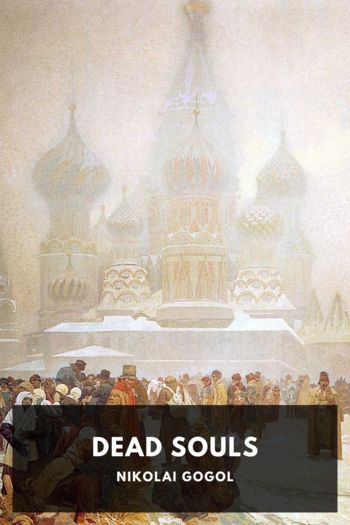Dead Souls - Nikolai Gogol (most life changing books .txt) 📗

- Author: Nikolai Gogol
Book online «Dead Souls - Nikolai Gogol (most life changing books .txt) 📗». Author Nikolai Gogol
Every one now edged away, and turned a deaf ear to his further babblings; but his words on the subject of the purchase of dead souls had none the less been uttered at the top of his voice, and been accompanied with such uproarious laughter that the curiosity even of those who had happened to be sitting or standing in the remoter corners of the room had been aroused. So strange and novel seemed the idea that the company stood with faces expressive of nothing but a dumb, dull wonder. Only some of the ladies (as Chichikov did not fail to remark) exchanged meaning, ill-natured winks and a series of sarcastic smiles: which circumstance still further increased his confusion. That Nozdrev was a notorious liar everyone, of course, knew, and that he should have given vent to an idiotic outburst of this sort had surprised no one; but a dead soul—well, what was one to make of Nozdrev’s reference to such a commodity?
Naturally this unseemly contretemps had greatly upset our hero; for, however foolish be a madman’s words, they may yet prove sufficient to sow doubt in the minds of saner individuals. He felt much as does a man who, shod with well-polished boots, has just stepped into a dirty, stinking puddle. He tried to put away from him the occurrence, and to expand, and to enjoy himself once more. Nay, he even took a hand at whist. But all was of no avail—matters kept going as awry as a badly-bent hoop. Twice he blundered in his play, and the President of the Council was at a loss to understand how his friend, Paul Ivanovitch, lately so good and so circumspect a player, could perpetrate such a mauvais pas as to throw away a particular king of spades which the President has been “trusting” as (to quote his own expression) “he would have trusted God.” At supper, too, matters felt uncomfortable, even though the society at Chichikov’s table was exceedingly agreeable and Nozdrev had been removed, owing to the fact that the ladies had found his conduct too scandalous to be borne, now that the delinquent had taken to seating himself on the floor and plucking at the skirts of passing lady dancers. As I say, therefore, Chichikov found the situation not a little awkward, and eventually put an end to it by leaving the supper room before the meal was over, and long before the hour when usually he returned to the inn.
In his little room, with its door of communication blocked with a wardrobe, his frame of mind remained as uncomfortable as the chair in which he was seated. His heart ached with a dull, unpleasant sensation, with a sort of oppressive emptiness.
“The devil take those who first invented balls!” was his reflection. “Who derives any real pleasure from them? In this province there exist want and scarcity everywhere: yet folk go in for balls! How absurd, too, were those overdressed women! One of them must have had a thousand roubles on her back, and all acquired at the expense of the overtaxed peasant, or, worse still, at that of the conscience of her neighbour. Yes, we all know why bribes are accepted, and why men become crooked in soul. It is all done to provide wives—yes, may the pit swallow them up!—with fallals. And for what purpose? That some woman may not have to reproach her husband with the fact that, say, the Postmaster’s wife is wearing a better dress than she is—a dress which has cost a thousand roubles! ‘Balls and gaiety, balls and gaiety’ is the constant cry. Yet what folly balls are! They do not consort with the Russian spirit and genius, and the devil only knows why we have them. A grown, middle-aged man—a man dressed in black, and looking as stiff as a poker—suddenly takes the floor and begins shuffling his feet about, while another man, even though conversing with a companion on important business, will, the while, keep capering to right and left like a billy-goat! Mimicry, sheer mimicry! The fact that the Frenchman is at forty precisely what he was at fifteen leads us to imagine that we too, forsooth, ought to be the same. No; a ball leaves one feeling that one has done a wrong thing—so much so that one does not care even to think of it. It also leaves one’s head perfectly empty, even as does the exertion of talking to a man of the world. A man of that kind chatters away, and touches lightly upon every conceivable subject, and talks in smooth, fluent phrases which he has culled from books without grazing their substance; whereas go and have a chat with a tradesman who knows at least one thing thoroughly, and through the medium of experience, and see whether his conversation will not be worth more than the prattle of a thousand chatterboxes. For what good does one get out of balls? Suppose that a competent writer were to describe such a scene exactly as it stands? Why, even in a book it would seem senseless, even as it certainly is in life. Are, therefore, such functions right or wrong? One would answer that the devil alone knows, and then spit and close the book.”
Such were the unfavourable comments which Chichikov passed upon balls in general. With it all, however, there went a second source of dissatisfaction. That is to say, his principal grudge was not so much against balls as against the fact that at this particular one he had been exposed, he had been made to disclose





Comments (0)